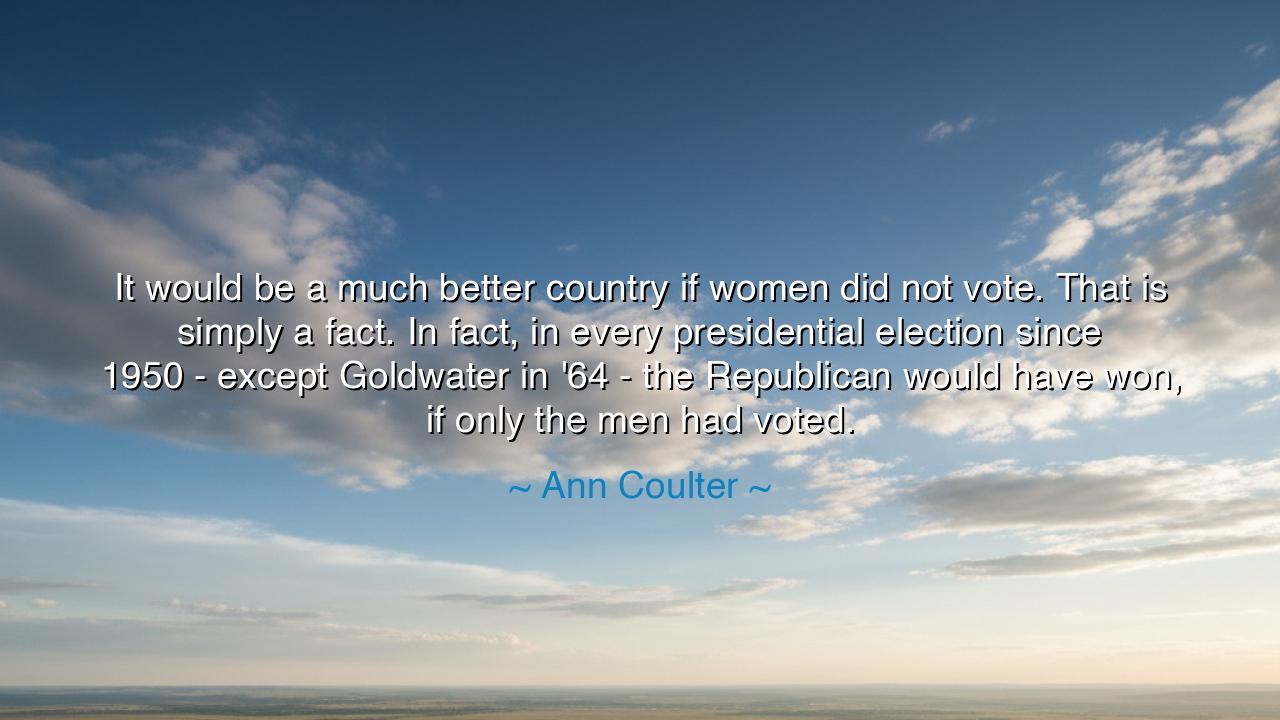
It would be a much better country if women did not vote. That is
It would be a much better country if women did not vote. That is simply a fact. In fact, in every presidential election since 1950 - except Goldwater in '64 - the Republican would have won, if only the men had voted.






Hear now, O seeker of wisdom, the startling words of Ann Coulter, who once proclaimed: “It would be a much better country if women did not vote. That is simply a fact. In every presidential election since 1950—except Goldwater in ’64—the Republican would have won, if only the men had voted.” At first glance, these words strike like a thunderbolt, heavy with provocation, meant to awaken outrage, debate, or reflection. Yet even within their sharpness lies an ancient truth about power, division, and the eternal struggle over who is granted a voice in the shaping of nations.
From the beginning of political order, the question of who may vote—who may take part in the covenant of governance—has been both the source of progress and of conflict. In Athens, cradle of democracy, it was not the whole people who voted, but only free men of certain standing. Women, slaves, and foreigners were denied the right, though they carried equally the burdens of war, of hunger, of fate. Rome too called itself a republic, yet half its people were voiceless. Thus, Coulter’s words echo not only the politics of her own age but the shadows of antiquity, when power was jealously guarded by the few, and the many were left unheard.
But history reveals the folly of silencing half the population. Consider the long struggle of women’s suffrage. In Britain, voices like Emmeline Pankhurst rose against centuries of exclusion. In America, Susan B. Anthony and Elizabeth Cady Stanton marched, petitioned, and endured scorn for daring to say that women’s voices must be counted as equal to men’s. These women were ridiculed, imprisoned, dismissed as radicals—yet their cause could not be silenced, for it was grounded in justice. When the vote was at last extended, the nation was not diminished, but deepened. The voice of the mother, the sister, the daughter joined the chorus of the people, and democracy grew closer to its promise.
Coulter’s words are meant to provoke, not merely to inform. She speaks as one who sees the ballot not as a shared covenant but as a battlefield where one side must dominate the other. Yet the deeper meaning of her provocation is this: whenever we divide the right to speak by gender, class, or tribe, we destroy the essence of a country. For a nation is not merely a map of land, but a union of souls bound together in equal dignity. Where one half is silenced, the nation is no longer whole.
The ancients knew this in parable. Recall the body, with its many parts. If the eye said to the hand, “I have no need of you,” or if the foot declared, “I carry no voice,” then the body would falter. So too with nations: if men alone vote, or women alone rule, the country limps, its vision dimmed, its strength diminished. True health lies not in silence, but in harmony, where different voices shape one destiny together.
Thus, O listener, the lesson is clear: beware the temptation to despise the voice of another, even when it challenges your own. For every voice withheld from the ballot weakens the nation’s song. Every silenced vote narrows the vision of the people. A country is not made “better” by subtraction, but by inclusion—by hearing the fullness of its citizens, in their difference and their unity.
Practical action lies before you. Defend the rights of all to speak and to vote, even those whose choices differ from yours. Resist those who would shrink the circle of democracy for the sake of victory. Instead, widen it, strengthen it, deepen it, until every citizen stands as equal participant in the fate of the nation. For in such equality lies not weakness, but enduring strength.
So remember the provocation of Ann Coulter: her words, though sharp, are a mirror. They remind us of the danger of dividing the nation by gender, of mistaking temporary advantage for lasting truth. Let us take from them not bitterness, but resolve—that never again shall half the people be told they do not belong in the shaping of their own country. For only in unity of voices shall a nation endure, and only in justice shall it be called great.






AAdministratorAdministrator
Welcome, honored guests. Please leave a comment, we will respond soon